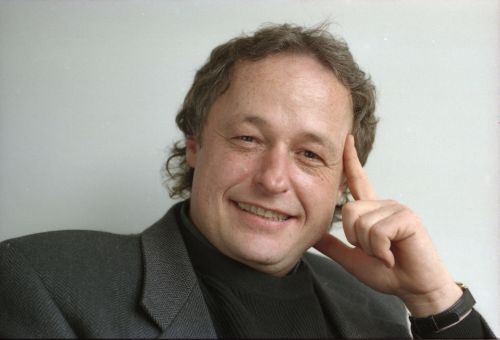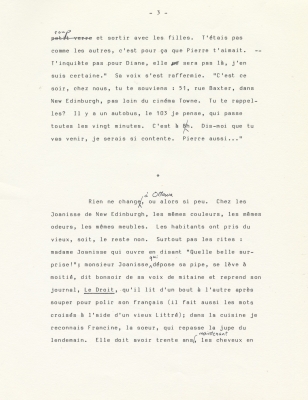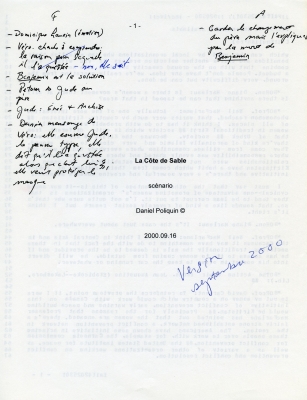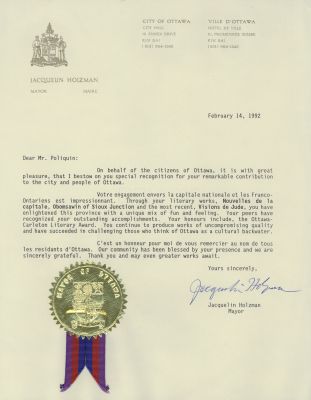There is hardly anything open in Ottawa on Sunday, shops close early, restaurants are cold and not very good, people are boring, Francophones speak badly, their jobs are uninteresting ... 1
Ottawa, a boring city? Perhaps from the perspective of certain characters in the work of Daniel Poliquin, the Franco-Ontarian writer most closely associated with the city of Ottawa. But from his point of view, never! He is best known for his colourful characters and mordant style.
Born in 1953, Poliquin grows up in the Ottawa neighbourhood of Sandy Hill. He goes on to work as a translator and interpreter for the public service and the House of Commons, while at the same time pursuing a career as a writer. He has published thirteen fictional works to date, along with a fictionalized biography of René Lévesque. Of these, two collections of short stories – Nouvelles de la capitale (1987) and Le Canon des Gobelins (1995) – and six novels –Temps pascal (1982), La Côte de Sable (1990, under the title Visions de Jude), L’écureuil noir (1994), La Kermesse (2006), L’Historien de rien (2012) and Cherche rouquine, coupe garçonne (2017) – take place, at least partly, in Ottawa.
In Poliquin’s hands, the City of Ottawa becomes a cosmopolitan and lively space. This is particularly true of Sandy Hill, with its high turnover of diplomats and students:
The population comes and goes, changes all the time. Diplomats are recycled every three years, members of Parliament and students every four, public servants every thirty. University professors are all but invisible, disappearing as they do every spring and sloping back to town every autumn. You never see them on weekends, and when they retire they vanish and are replaced by others, who are equally invisible. You can form a close friendship with someone, and then suddenly never see him or her again. I liked that very much.2
Whether they come from the region or from the farthest corners of the world, Poliquin”s characters do not hesitate to open up to others. They believe they should “mix two cultures together to make life go down a little better.”3 The City of Ottawa thus appears as a meeting place, a crossroads where all cultures converge.
These encounters take place in French in his novels. His characters speak French amongst themselves, regardless of their origins. Even his Anglophone characters speak most often in French. Poliquin also Frenchifies the city using local versions of certain English names. In his work, for example, the “New Edinburgh” neighbourhood becomes “le Petit Édimbourg,”4 and Anglesea Square becomes the “carré Anglicy.”5
For a different perspective on Ottawa, Daniel Poliquin’s books are a must-read. They encourage us to explore the city, to walk in his footsteps, and to discover, in turn, the places he reveals in his work.
1 Daniel Poliquin, Nouvelles de la capitale, followed by Le Canon des Gobelins, Ottawa, Éditions Prise de parole, “Bibliothèque canadienne-française” collection, 2001 [1987 et 1995], p. 111 (translated from the original).
2 Daniel Poliquin, Black Squirrel, , Vancouver and Toronto, Douglas & McIntyre, translated by Wayne Grady 1995, p. 20-21.
3 Daniel Poliquin, Visions of Jude, Vancouver and Toronto, Douglas & McIntyre, translated by Wayne Grady, 1992, p. 183.
4 Daniel Poliquin, Nouvelles de la capitale, suivi de Le Canon des Gobelins, op. cit., p. 114.
5 Daniel Poliquin, L’Historien de rien, Montréal, Boréal, 2012, p. 55.
Daniel Poliquin, author, Ottawa, Novembre 9, 1994. Photo: Étienne Morin, Le Droit.
University of Ottawa, CRCCF, Fonds Le Droit (C71), Ph92-9- 091194POL18.




